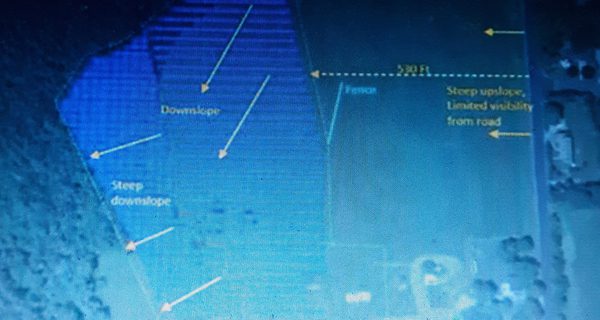The planned solar panels on Fisher Road.
By James Kinneen
Hometown Weekly Reporter
Residents have called it “basically extortion by the county,” warned “we will regret this,” and threatened lawsuits to both the town and Norfolk County for damages if it goes through. Board of Selectmen members have said the county is being “opportunistic and disrespectful,” accusing them of taking advantage of COVID-19, and are largely against it. But none of that may make a difference when it comes to Norfolk County’s plan to clear the land behind Norfolk Aggie, and on the fields of North Street, to build solar panels for Norfolk Aggie students - because Walpole doesn’t own the land, they only lease it.
The main issue the town is struggling with is that Walpole does not own that land, Norfolk County does. Norfolk County hasn’t gone ahead and started the solar panel project yet, because legally they have to give Walpole ninety days to decide whether the town would like to lease the land for another 20 years, the cost of which would be around $200,000 a year. Walpole has until September 25 to decide whether they will renew the lease or not.

So far, the town has not had that vote. In an August 4 meeting that presented the energy companies’ outline of the solar panel project, the Board of Selectmen noted they were not comfortable voting on this issue without hearing from town residents. After receiving feedback from residents on September 1, the board unanimously voted to ask the county for an extension of time beyond the ninety days to make the decision whether to lease the land or not, as well as an in-person meeting with the person from Norfolk County in charge of making the decisions from their end.
The energy company believes there would be numerous advantages for Walpole, should the solar panels be built. As part of their presentation, they noted: “The projects alone will generate taxes for Walpole. Our estimate based on what we’ve done and what the costs are - the personal property taxes and the real property taxes - but the taxes over twenty years will be somewhere in the range of 1.5 to 1.8 million, and all of that is worked out with the assessor, as well as the Board of Selectmen in Walpole.” The company also noted that once the panels are up and running, they could sell discounted energy to Walpole and help the town in its mission to use 100 percent renewable energy by 2050.
Money is a big issue both ways. When the conversation about a cost-benefit analysis came up, Town Administrator Jim Johnson noted that while he hadn’t done a deep dive into the numbers, when he examined the project two years ago he realized there's a significant monetary difference between the two options. “Let’s call it $100K revenue the town would take in one way or another from taxes versus the $200K per year we’d have to pay out, with a 1.5 percent escalator in the contract. So, we’d need to come up with that money each and every year,” he noted. He then summarized: “That’s like a $300K swing every year.”
What are you getting for that much money? That’s another issue. On September 1, Jim O’Neil pondered whether there was any way the town could ask the county for a lease-to-buy deal. Unlike when the town purchased Adams Farm, the land of which it now owns forever, O'Neil noted that if you’re just leasing the land for twenty years, “you pay the four million dollars, and you don’t really have anything.”
At the September 1 meeting, the residents who spoke were fiery in their opposition to the solar panels. While the energy company promised the site would be restored to how it looked previously once the project was finished, Mauro Dellemonache noted: “That’s physically impossible. Behind the Aggie, they’re clear-cutting well over fifteen acres of mature trees and on North Street they’re cutting mature trees.” She then added: “their photos are skewed. They look like the panels won’t be close to the road. You’ll see the solar panels from the road on North St. That’s a guarantee.”
Catherine Kennedy owns a horse farm on North Street, which is her family’s sole source of income. The solar panels will run along her backyard, so she wanted the town to know: “[I've] already retained an attorney, and should the county and town pursue the solar energy farm, I plan to, and have already begun the process of preparing a lawsuit against the county, the town and Kearsage Energy for loss of income to my business, damages to my property, for the devaluation to my property, and for the damage to the greater community and my neighbors.”
Susan Shocket, president of the Walpole Preservation Alliance, claimed she was looking to escalate to the state level and work with state agencies who are actively working with funds set aside to preserve “land exactly like we’re talking about,” including the Massachusetts Department of Agricultural Resources, Smart Solar Initiative, and the Resilient Lands Initiative. She was very upset that most of the places she had talked to in the state government had not been contacted by the government of Walpole about this issue - despite them, she alleged, having known for the past three years this was an issue of great importance to the town. She was hoping for the town to buy some additional time past the ninety days for her to “work with a land trust to put a conservation restriction on that property that would help to preserve the land in perpetuity, so that we don’t have to worry about the next scheme the county comes up with to use that land.” She noted the county tried to use it as a prison in the 70s, a sludge dump in the 80s, and a golf course in the 90s.
At the end of the September 1 meeting, Ben Barrett tried to comfort residents by arguing “This is just the first step, the issue of this lease … After that takes place either way, there’s still the construction, the permitting, a whole number of phases to this project that are still to take place.” He declared: “This board is more than willing, even once this out of our hands, to stay engaged with the residents and assist in any way we can.”
But the Norfolk County lawyer appears to have rejected the idea that Walpole has much power over the land once Norfolk County owns it outright. In the August 4 meeting, Jim Johnson noted that Walpole has a zoning overlay district that requires solar panel farms like the one at the landfill site off of West Street to come forward and do a zone overlay district, to be approved by a two-thirds vote of the town meeting, but “it’s the county's position, from what I understand, that they are not required to go before town meeting, because they’re exempt as a governmental body.”
The county’s lawyer added while they would like to work with the town and meet their reasonable requests, because of their exemptions, "at the end of the day, we can move forward with the project even though the area in question is not zoned for solar.”
There are many questions the town has to answer about this project. Is around $200,000 a year in taxpayer revenue worth essentially renting the land, with no hope of ever owning it? If not, is there some other way to generate the money? Can some kind of state conservation committee keep the land from being cleared, even if Walpole doesn’t continue the lease? And, what kind of power, if any, does Walpole have over the project, should they give the land back to Norfolk County?
While these are all valid questions, unless Norfolk County gives them an extension on the ninety days, there’s only one question the town needs to answer by September 25: are you going to lease the land or not?























